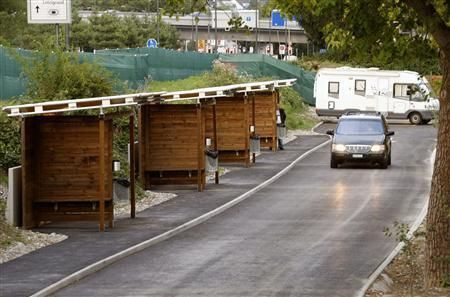Zurich Sex Boxes: Soft Opening For Switzerland’s Much-Hyped Prostitution Drive-In

Switzerland’s first-ever prostitution drive-in officially opened for business on Monday, but not everyone is turned on by the idea.
The drive-in is part of a plan to create a safer space for Zurich sex workers and reduce street-based prostitution in Switzerland’s largest city. (Prostitution is legal throughout Switzerland.) It was narrowly approved by Zurich voters in a March 2012 referendum. The facility consists of a row of garage-like “sex boxes” where clients can pay to park their cars with a prostitute. Sex workers who use the facility must pay a maintenance tax of $5.40 per night, and they can hawk their wares outside the booths on a colorfully lit track. Security guards are on hand to keep the facility safe.
It’s an imaginative idea in a country where some 1,200 women registered as sex workers last year, but whether or not it will be embraced is still an open-ended question. Although the high-profile project’s grand opening attracted a slew of reporters and journalists on Monday, few clients actually used the facility during its first evening of business, according to the Local, an English-language news site that reports on Scandinavia and parts of Europe. The Local’s Malcolm Curtis reported that there was little activity during its hours of operation -- 7 p.m. to 5 a.m. -- although he speculated that prostitutes and johns may be waiting for the media spotlight to die down before they make use of the drive-in.
Thomas Meier, a spokesman for Zurich’s social services, downplayed the low turnout in a statement to Euronews, saying expectations were low for the first evening but adding that the drive-in is off to a “promising start.” He conceded, however, that an accurate measure of the site’s success could take time due to the high level of confidentiality in the sex industry.
Prostitution has been legal in Switzerland since 1942 and is regulated in brothels situated in the country’s larger cities. Street prostitution is prohibited, however, and Zurich residents have long complained about the open sex trade in some parts of the city.
However, the sex boxes have faced criticism from some women’s advocates who say the facility distracts from the larger issue of sex trafficking in Switzerland. UNHCR, the refugee agency of the United Nations, identifies the country as a primary destination for women and children forced into sex trafficking from Central and Eastern Europe. Last year, the group criticized the Swiss government for not doing enough to address the problem, although it acknowledged that significant new steps were being taken, including a government-funded campaign against child sex tourism.
Sex boxes have been in use since the 1980s, beginning in the Dutch city of Utrecht, where the facilities are called afwerkplek, loosely translated as “work place.”
© Copyright IBTimes 2025. All rights reserved.






















